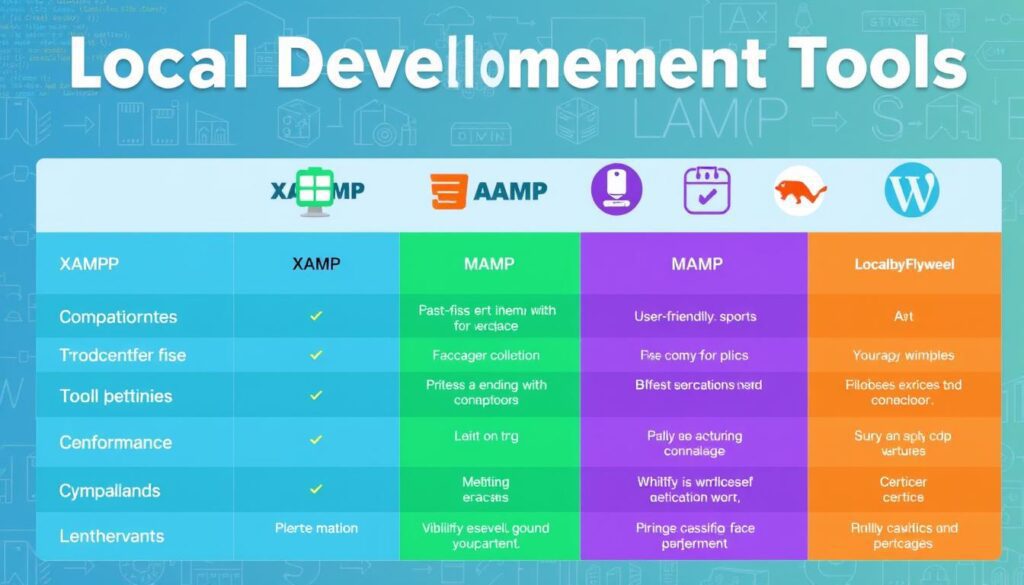Important Lessons
Understanding Localhost and Local Web Development Basics
Examining the Loopback Address (127.0.0.1)
Websites can be tested on developers’ personal PCs using the loopback address 127.0.0.1. This unique address acts as a virtual gateway to your local testing environment. It makes web development smooth without needing an external server.
Key Benefits of Local Development Environments
- Instant access to web projects without internet connection.
- Safe testing of new features and code changes.
- Reduced development costs.
- Improved performance optimization.
“Localhost is the developer’s playground – a space where creativity meets technical precision.” – Web Development Experts
How Local Servers Enhance Development Workflow
Local servers make testing better by giving developers quick feedback and debugging tools. They can test code changes fast, check complex interactions, and find issues early.
| Local Development Feature | Workflow Impact |
|---|---|
| Instant Previews | Immediate visual feedback |
| Offline Accessibility | Work from anywhere without internet |
| Secure Testing | Isolated development environment |
Using localhost and 127.0.0.1, web developers can make strong, bug-free apps efficiently.
Setting Up Your First Local Development Environment
Creating a local server environment is key for web developers. Tools like XAMPP and WAMP help build and test websites on your computer.
Choosing the right tools depends on your project needs. Web developers follow these steps:
- Select an appropriate local server package
- Download the installation files
- Configure server settings
- Test the local development environment
“A well-configured local server transforms your computer into a complete web development workspace.” – Web Development Experts
XAMPP is a top choice for many developers. It works on Windows, macOS, and Linux. It includes Apache, MySQL, PHP, and more for web development.
- Easy installation process
- Cross-platform compatibility
- Comprehensive software package
- Free and open-source
WAMP is great for Windows users. It offers similar features but with different settings. Developers can set up a local server without complex technical knowledge.
| Feature | XAMPP | WAMP |
|---|---|---|
| Operating System | Multi-platform | Windows only |
| Ease of Installation | Very Easy | Easy |
Choosing the right local server package helps developers work efficiently. They can create, test, and refine web projects before they go live.
Essential Local Development Tools and Servers
Web developers need strong tools to make websites work well. Local development environments are great for testing and building sites before they go live. Knowing the best tools can make your work easier and faster.

Choosing the right local development stack is key for smooth web work. Two top picks in the web world are XAMPP and WAMP.
XAMPP vs WAMP: Selecting Your Development Stack
Developers often choose between XAMPP and WAMP for their needs. Here’s what makes each one special:
| Feature | XAMPP | WAMP |
|---|---|---|
| Platform Support | Cross-platform (Windows, Mac, Linux) | Windows Only |
| Apache Version | Latest Stable Release | Windows-specific Build |
| MySQL Management | PhpMyAdmin Included | Built-in Database Tools |
Popular Development Tools for Local Testing
Good local testing needs strong tools. Here are some top picks:
- Visual Studio Code
- Brackets
- Sublime Text
- Netbeans
Managing Multiple Projects with Virtual Hosts
Virtual hosts let developers run many sites on one server. By setting up virtual hosts in XAMPP or WAMP, you can mimic real hosting setups. This makes your development smoother.
“Virtual hosts are the Swiss Army knife of local web development” – Professional Web Developer
Each tool has its own benefits. Try out different setups to find the best fit for your work.
Localhost Security and Best Practices

Keeping your local web development area safe is key. Even though localhost is in a closed network, developers need strong security steps. This is to protect sensitive project data.
Experts say there are a few main ways to boost localhost security:
- Turn off remote access to localhost when you don’t need it
- Use strong, unique passwords for local servers
- Update your development tools and software regularly
- Use network-level firewalls for protection
“Security is not an option in web development—it’s a requirement, even in local environments.”
Here are some important security settings for localhost:
| Security Aspect | Recommended Action |
|---|---|
| Server Configuration | Limit user permissions |
| Database Access | Use strong authentication methods |
| File Permissions | Restrict read/write access |
Remember that a secure localhost environment protects your web development workflow from potential vulnerabilities.
Troubleshooting Common Localhost Issues
Working on a local server for web apps can be tricky. Developers often face specific problems that slow them down. Knowing how to fix these issues can make your development work easier.
Using localhost 8080 and other local servers comes with its own set of challenges. We’ll look at common problems and how to solve them.
Resolving Port Conflicts
Port conflicts are a big issue for developers. When many apps try to use the same port, like localhost 8080, you need to find ways to handle it:
- Check currently active ports using system commands
- Terminate conflicting processes
- Configure alternative port numbers
- Use port scanning tools to identify open ports
Fixing Database Connection Problems
Database connection issues can really slow you down. Here are some steps to fix them:
- Verify database service is running
- Check connection credentials
- Ensure correct server configuration
- Review firewall and security settings
Common Configuration Errors
Configuration errors can mess up your local development setup. You must be adept at identifying issues and comprehending your tools in order to resolve these.
By learning these troubleshooting tips, developers can make their local server environments better. This ensures web app development goes smoothly.
Final Thoughts
Learning to use localhost as a testing ground is key for web developers. It lets them work on web apps safely without affecting live sites. This way, they can test and improve their projects without worries.
Developers who know how to use localhost well have more control over their work. They can set up servers, fix bugs, and try out new features easily. This makes building and keeping up web apps much better.
Those who learn about localhost gain a big edge in their work. They can set up local servers, handle virtual hosts, and solve problems specific to their environment. This skill makes them stand out from others.
As tech keeps changing, localhost stays a vital part of web development. Take risks with your experiments, dive into local testing, and watch your abilities develop. Your work will become more accurate and imaginative.
FAQ
What exactly is localhost?
“Localhost” is a reference to your own computer. It enables you to reach your web server through localhost or 127.0.0.1. This facilitates web application testing for developers on their personal PCs without an internet connection.
Why do web developers use localhost?
Developers use localhost for a few key reasons. It’s a safe space to: – Build and test websites and web applications – Debug code without affecting live sites – Work offline – Simulate server environments locally – Develop and experiment without extra hosting costs
Describe the loopback address?
127.0.0.1 is an example of a loopback address that always points to your device. It lets software talk to local server services without an external network.
Can I run multiple projects on localhost?
Yes! You can run many projects on localhost. Use virtual hosts to set up different projects on different ports or domain names. Tools like Apache make this easy.
What are common localhost ports?
Some common ports are -80 (the default port for web servers). – 8080 (an alternate port for web servers) For Node.js apps, 3000 Five Thousand (for Python development) Different web services or apps use each port.
How do I resolve port conflicts on localhost?
To solve port conflicts: – Find out which apps use specific ports – Stop those apps – Change the port in your server settings – Use port forwarding – Use tools like netstat to see active ports
Is localhost secure for development?
Since localhost is exclusive to your computer, it is extremely secure. Use secure passwords and keep your equipment up to date to stay safe. Avoid storing private information. Disable unnecessary services.
What development tools work best with localhost?
XAMPP (for all platforms) is a great solution for localhosting. WAMP (Windows version) MAMP (Mac) Vagrant, Docker, and Visual Studio Code PHPStorm







I really like your blog.. very nice colors & theme. Did you make this website yourself or did you hire someone to do it for you? Plz respond as I’m looking to construct my own blog and would like to find out where u got this from. cheers
Highly engaging